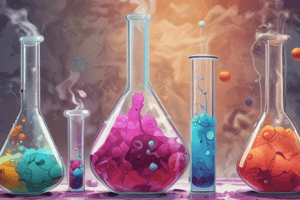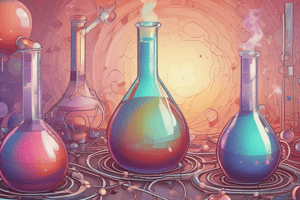Podcast
Questions and Answers
What is a common characteristic of chemical reactions?
What is a common characteristic of chemical reactions?
- Involves the motion of electrons (correct)
- Involves the motion of molecules
- Involves the motion of protons
- Involves the motion of neutrons
What type of reaction involves the combination of two or more elements to form a new compound?
What type of reaction involves the combination of two or more elements to form a new compound?
- Combination reaction (correct)
- Decomposition reaction
- Oxidation reaction
- Single displacement reaction
What is an example of a thermal decomposition reaction?
What is an example of a thermal decomposition reaction?
- Carbon monoxide reacting with oxygen to form carbon dioxide
- Hydrogen combining with oxygen to form water
- Copper (II) carbonate decomposing into copper (II) oxide and carbon dioxide gas when heated (correct)
- Electrolysis of water
What is the classification of a reaction in which a single compound splits into two or more simple substances?
What is the classification of a reaction in which a single compound splits into two or more simple substances?
What is an example of a combination reaction between an element and a compound?
What is an example of a combination reaction between an element and a compound?
What is the classification of a reaction in which two or more compounds combine to form a new compound?
What is the classification of a reaction in which two or more compounds combine to form a new compound?
Flashcards are hidden until you start studying
Study Notes
Chemical Reactions
- Chemical reactions involve the motion of electrons, leading to the formation or breaking of chemical bonds.
- They can be classified as: combination or synthesis reactions, decomposition reactions, single and double displacement reactions, oxidation and reduction.
Combination Reactions
- In combination reactions, two or more substances combine to form a new single substance under suitable conditions.
- They can be classified into three types:
- Reactions between two or more elements (e.g., hydrogen combining with oxygen to form water).
- Reactions between two or more compounds (e.g., carbon dioxide dissolving in water to form carbonic acid or soda water).
- Reactions between an element and a compound (e.g., carbon monoxide reacting with oxygen to form carbon dioxide).
Decomposition Reactions
- In a decomposition reaction, a single compound splits into two or more simple substances under suitable conditions such as heat, light, or electricity.
- Decomposition reactions are classified into three types:
- Thermal decomposition (e.g., copper (II) carbonate decomposing into copper (II) oxide and carbon dioxide gas when heated).
- Electrolytic decomposition (e.g., electrolysis of water resulting in the separation of hydrogen and oxygen).
- Photo decomposition (e.g., silver chloride decomposing into silver and chlorine gas in the presence of sunlight).
Chemical Reactions
- Chemical reactions involve the motion of electrons, leading to the formation or breaking of chemical bonds.
- They can be classified into five types: combination, decomposition, single and double displacement, oxidation, and reduction reactions.
Combination Reactions
- Involve two or more substances combining to form a new single substance under suitable conditions.
- Classified into three types:
- Reactions between two or more elements (e.g., 2H2 + O2 → 2H2O).
- Reactions between two or more compounds (e.g., CO2 + H2O → H2CO3).
- Reactions between an element and a compound (e.g., 2CO + O2 → 2CO2).
Decomposition Reactions
- Involve a single compound splitting into two or more simple substances under suitable conditions (heat, light, or electricity).
- Classified into three types:
- Thermal decomposition (e.g., CuCO3 → CuO + CO2, when heated).
- Electrolytic decomposition (e.g., 2H2O → 2H2 + O2, through electrolysis).
- Photo decomposition (e.g., 2AgCl → 2Ag + Cl2, in sunlight).
Studying That Suits You
Use AI to generate personalized quizzes and flashcards to suit your learning preferences.




